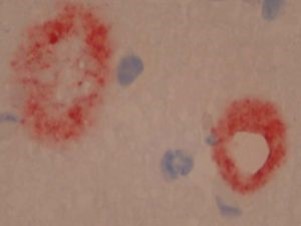Beta amyloid by IHC
Beta amyloid by IHC-12376 - Technical only, 12379 - Technical & interpretation
Beta amyloid by IHC
12376 - Technical only, 12379 - Technical & interpretation
LAB12376
LAB12379
LAB12379
IHC
- All IHC stains will include a positive control tissue
- Beta amyloid is used to identify amyloid angiopathy, and is more sensitive than congo red stains
- This antibody can also identify Alzheimer's neurofibrillary tangles
- This antibody will not identify the other types of amyloid (use kappa and lambda to identify primary amyloidosis/plasma cell dyscrasias; we don't have antibodies to the SAA (serum amyloid associated protein) or beta 2 microglobulin protein types of amyloid
Tissue
Prepare a formalin-fixed, paraffin-embedded (FFPE) tissue block
FFPE tissue block
Tissue section mounted on a charged, unstained slide
Ambient (preferred)
- Unlabeled/mislabeled block
- Insufficient tissue
- Slides broken beyond repair
AHL - Immunohistochemistry
Mo - Fr
1 - 2 days
Immunohistochemical staining and microscopic examination
If requested, an interpretive report will be provided
Specifications
- Beta amyloid is an extracellular filamentous protein deposit found in the brain, and is the major protein of amyloid cores, neuritic plaques, and neurofibrillary tangles
- This protein is found in Alzheimer's disease, and other rare types of dementia
- Beta amyloid is also found in amyloid angiopathy, which is a leading cause of spontaneous intracerebral hemorrhage in the elderly
Staining patterns
- Cytoplasmic staining
References
- Ishihara T et al: The significance of cerebrovascular amyloid in the aetiology of superficial (lobar) cerebral hemorrhage and its incidence in the elderly population. J Pathol 1991; 165:229-234.
- Vinters HV et al: Immunohistochemical study of cerebral amyloid angiopathy. III: Widespread Alzheimer A4 peptide in cerebral micro-vessel walls co-localizes with gamma trace in patients with leukoencephalopathy. Ann Neurol 1990; 28: 34-42.
88342 - 1st stain
88341 - each additional stain
88341 - each additional stain
05/11/2017
10/17/2018
01/12/2024
